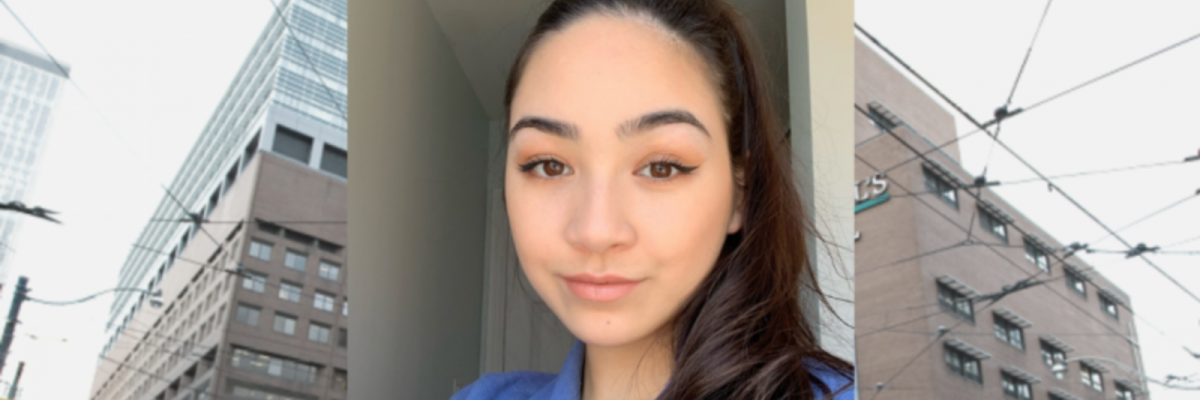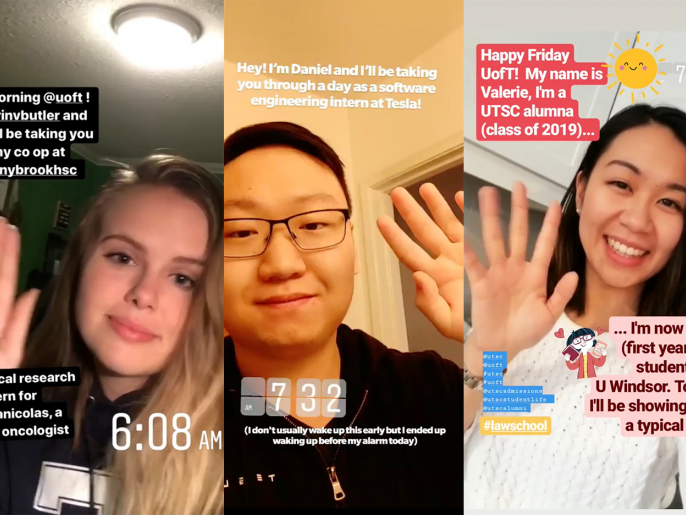Angela Fedorouk
Mental Health Studies Specialist
Written by Alexa DiFrancesco
The moment I begin our Zoom meeting, Angela Fedorouk greets me with a smile as bright as the sunlight flooding into her bedroom. Though this expression would immediately charm a potential interviewer, the third-year student admits she has anxious tendencies: “I’m very much an introvert. I’m really trying to push myself out of my comfort zone. I know that being in a co-op program will do exactly that.”
I tell Angela that I wouldn’t have known this fact otherwise, to which she laughs. “I’ve gotten that a lot. I’m not even trying to sugar-coat or put co-op on a pedestal; it really has done so much for me. It’s because of these courses that I’m able to now communicate how I’d like to, whether it makes me super uncomfortable or not.”
Due to the COVID-19 pandemic, ‘uncomfortable’ is a term the Mental Health Studies Specialist has been forced to adapt to. Though originally recruited as a research assistant for a study at St. Michael’s Hospital, Angela’s duties quickly changed during her eight-month work term. She and her team are currently exploring the extent to which COVID-19 occurs amongst children, and how preventative measures impact the health of families.
“My job was kind of two-fold,” she reveals. “I was entering data in the office, which was downtown, and then I also was able to go to a clinic. That’s where I recruited and followed up with participants for the study. Mid-March was when we were sent home to work remotely. Within that month, [researchers] developed the new COVID study. Mid-April until now, my job description has switched over to recruiting for that.”
In circumstances which have required many co-op students to terminate their work terms early, Angela considers herself lucky to be actively employed. One of the reasons? The determination needed to secure her placement. “I actually sought twice,” she shares. “My first seeking cycle I didn’t secure. It’s so funny because I’d been to an interview for this same job. I came back, and usually, they’ll say, ‘Nice to meet you.’ They actually said, ‘Nice to meet you again.’ So I knew they remembered me.”
UTSC has long been known as the University of Toronto ‘co-op campus’ because of its ability to offer formal job training. Thus, many students are unfamiliar of the prospect of failing to secure a work term. Angela admits that, although her experience in the co-op program wasn’t as expected, she feels as though she benefitted from the extra time to alter her resume: “Before my next seeking cycle, I did take a couple courses that I was able to add”
The tactic of including university courses onto a resume is one Angela relied on heavily when securing a work term. “Interviewers will look at the courses and see how it applies to the job,” she reveals. “They’ll ask me questions that are specific to those courses. For a person who may not have a ton of things to put on their resume, it can be really good. Employers seemed interested in what I had to say.”
Angela stresses the importance of tailoring a resume with classes that relate to each job posting. As a research assistant, the courses she chose included Psychological Research Laboratory (PSYB01) and Clinic Neuropsychology (PSYC73). Both are program requirements for the Mental Health Studies Specialist. “These were courses that have not only helped me with the theory side, but the practical side of my job,” Angela mentions. “[PSYC73] taught me how to properly follow procedures, and that’s what I’ve used at the clinic. I’m administering nutritional health questionnaires, I’m taking anthropometric measurements. If I do something incorrectly or differently, the data won’t be accurate. [PSYB01] was all about research methods. It helped me understand how I fit into this larger study. They’ve already done the literature review, so I’m helping them collect data. Further down the line, they’ll analyze the data that I collected.”
Though Angela offers many pieces of advice when writing job applications, she only has one suggestion when attending interviews: be yourself. “Everyone applying to jobs has the requirements on their resume,” she discloses. “That’s why they got chosen for the interview. What makes you stand out is your personality. This is when they can put a face to the skills that are listed. If you try to be someone you’re not and you get the job, then you have to keep up an act and you might not be able to.”
Because she’s already completed her program requirements, Angela has decided not to pursue another work term. Though she won’t have to encounter the seeking-cycle again during her university career, she’ll always remember the resiliency learned from her co-op journey. She encourages students to bring this trait to every potential employer: “During the interview, they asked me why I applied again. I told them it would either work in my favour or against my favour. I think that they appreciated that. Imagine it from their perspective; if you don’t apply again or you’re scared to, you’ve lost interest in their company. If you’re turned away once and you keep going, you’re persistent.”

